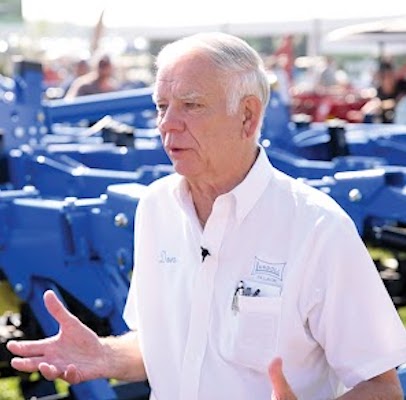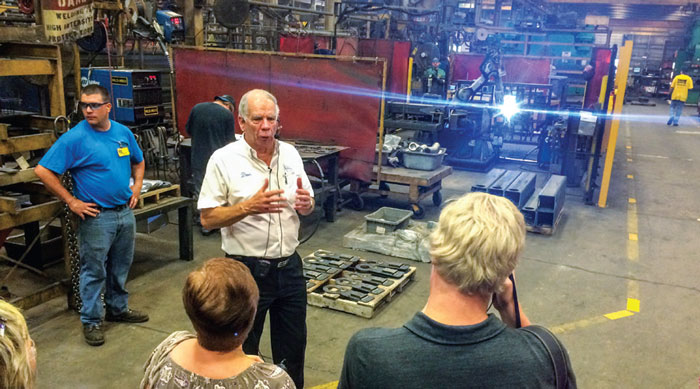Don Landoll, one of 8 children raised on a farm in Hanover, Kan., was destined to be a manufacturer. With the encouragement of his parents, he graduated from Tinker Toys to an Erector set at age 7, before the farmstead even had its own electricity.
With 4 Landoll families (and 22 first cousins) all living within a mile of each other, the young boy had plenty of opportunities to hone his curiosity, and his repair skills, alongside Dad and Grandpa.
He learned to weld as a high school freshman in vocational ag, after a teacher recognized his abilities and turned him loose. “When I was a sophomore, we went to Grandpa’s farm, sawed down trees, ran them through a sawmill and built a shop to weld in,” he says. With welding equipment of his own, the odd jobs for relatives and neighbors flooded in.
Still in high school, Landoll designed and built his own farm wagon and even taught hands-on welding to fellow students. “I never stopped building from that time on,” he says.
Change of Plans
Landoll enlisted in the U.S. Air Force, and left town within days of his high school graduation. A failed physical returned him home days later. But the setback would prove fortuitous.
He landed at his hometown International Harvester dealership (Hanover Implement & Manufacturing), where he welded truck/trailer hoists and playground equipment; sideline work for the dealer.

Photo by: Jeff Lazewski
He worked side by side and lunched each day with a 50-year-old welder and World War II veteran. “I was willing to learn and he was willing to teach,” he recalls.
Just 2.5 years later, this co-worker picked the youngest employee in the dealership to go into business with him. Since Landoll was not yet 21, his partner had to co-sign the loan for him and they purchased a 12,500-square-foot blacksmith shop (Quick Service Welding Company) in Marysville, Kan., in 1963.
The 3-man operation offered general welding, radiator repair and blacksmith services — instilling the virtues of diversification for the 20-year-old. When his partner left to work on the railroad 3.5 years later, the pair drew up a financed buyout and the young Landoll became sole proprietor.
First Products. With the volatility of the job shop world, Landoll eventually created a product in his own name, a slide-in stock rack for pickup trucks.
The next big opportunity came from building a liquid supplement livestock feeder that led to working with Nutrena Feeds and exposure into Canada. “We built thousands of those and that was a means of cash, with no terms and no sales commissions,” he says.
Soon after, Dempster Industries hired him to build dual toolbars to meet the demand for stronger implements that were accompanying the higher horsepower tractors on the scene.
Landoll wore — and continues to wear — many hats. “In the first 11 years, I did everything. I was sales, buyer, plant manager and engineer. I’m a big believer in setting goals and, when you meet one, set another one and continually climb the ladder.”
In 1968, one of Landoll’s friends wanted a chisel plow. “We built the first one using an anhydrous ammonia bar that we beefed up and spread out. It was a defining moment.” Landoll went to the Nebraska State Fair and discovered a distributor from Kansas City looking to get into tillage.
More on Don Landoll
For more on Don Landoll and Landoll’s contribution to the farm equipment industry, check out the following content:
Landoll says the popularity of that implement brought the major line Case knocking, who needed to fill a gap for its company-owned stores. Landoll didn’t have an engineer on staff, but still won the business by a 3-1 vote. Soon, Case wanted its own name on the tool and awarded Landoll the orders for Case’s subsoilers, V plows and coulter chisels.
As farms and equipment were growing in size and dealers and farmers had newer transport needs, Landoll saw an opportunity to build trailers. In 1970, the company was granted numerous patents for the traveling axle, ground-loading trailer, which remains the backbone of the Landoll trailer line.
Nearly 20 years ago, AGCO laid off virtually all its Sunflower sales team, and Landoll answered a knock again. He hired 9 ex-Sunflower salesmen in one day, and immediately built a new shop that has since been added onto numerous times. These aggressive moves led to the bold decision to rebrand and change the corporate colors from yellow to blue.
The success of the Sunflower staff acquisition led to additional growth opportunities and plant expansions. In 2003, Landoll acquired the Drexel Forklift line and began manufacturing the SwingMast line of trucks and then acquired ICON Construction in 2007. In 2010, the company acquired Brillion Farm Equipment, filling out its tillage, seeding and seedbed prep offerings. And in 2013, it opened its industry leading “Parts Distribution Center” in Marysville.
“Don achieved an unbelievable amount of success in his diversified segments, starting at an age when he was too young to sign the bank note. He’s built a large, successful organization employing hundreds of people without having an MBA, or even a BA. He’s truly a one of a kind in our business.…” – John Tye, retired, The Tye Co.
‘Build Our Own’
Landoll’s agility and open-mindedness helped him thrive during the dark 1980s that killed many manufacturers. A desperate manager from FMC Corp. had seen the welds on the Landoll chisel plows at a dealership, and called Don to see if he’d be willing to learn a new business — trailers for the aircraft ground support business.
In 1984, Landoll received a $43 million contract (a record for a small business). It would lead to manufacturing and assembly contracts for the U.S. military.
And Landoll hasn’t been without a government contract since. “The big contracts allow you to justify buying the very best equipment and technology,” he says. “And at the end of the contract, you still have the very best.” For example, the world-class technology secured to produce 2,000 military wreckers has lived long beyond that contract, and is employed on the firm’s seedbed preparation and trailer production today.
Special Recognition to Suppliers
Prior to a community- and family-oriented celebration in Marysville, Kan., in May 2014 to celebrate his company’s 50th anniversary, Founder Don Landoll hosted a luncheon for his suppliers, lenders, dealers and colleagues of the Farm Equipment Manufacturers Assn. who he credits as critical to his success since meager beginnings in 1963.

Landoll’s luncheon remarks reinforced the authenticity of the relationships he’s built. Employees, dealers, suppliers and lenders are all the foundations of the business, he says.
He did something there that we’ve never seen done before, even in companies one-tenth of his size. He directed each of the hundreds of guests (including this editor) to take the roving microphone and introduce themselves and their company. Following each introduction, while speaking in the center of the room with his own mic, he shared an off-the-cuff memory and anecdote on each. Following the meal, he personally led the group on a 3.5-hour tour of the production facilities, which included Landoll’s own self-designed and built plant machinery. The day culminated in the larger community celebration, featuring supper, music and fireworks. The attendance was not exactly known, but Landoll recalls that nearly 6,000 meals were served at the event — in a town with a population of 3,100.
“We loved working with Don and the people at Landoll,” says Marlon Cohn, retired owner/president of Haven Steel, which has supplied Landoll for the last 40 years. “They do business the way it should be done — concise and efficiently. At plant visits we’d cover all of our business, and then we’d be treated to lunch at Landoll Lanes or The Cattle Barn.”
If you’ve ever been on a plant tour at Landoll (open to everyone who offers reciprocity), it’s clear that he intimately knows each of his production machines. Landoll made a personal pledge to build the most advanced tillage factory in America, and his lineup includes 9 plate laser cutters, 4 tube lasers, 6 CNC press brakes, 25 CNC machining centers, a water-jet cutting table and one of the nation’s first fiber-optic laser cutters.
His goal of building the most advanced tillage factory in America led Landoll to search for robotic welders. When he couldn’t find a robotic welder to meet his requirements, he built his own — on three different occasions. Today, more than 30 welding robots dot the plant. He’s proud of the vertical integration of “bringing plate and tubing in the door and shipping out a finished product.”
Strong Foundation
Today, the company has nearly 1 million square feet of manufacturing capacity, nearly 1,000 employees and ships its products to 39 nations. In addition to its ag equipment core are 4 other divisions — construction, forklifts, trailers and OEM/government.
Landoll sees a bright future for his shortline ag products because majors don’t focus on tillage. “Their sales volumes are in tractors, combines and planters. When you look at the percent of their income from tillage, it’s small. There’ll always be a need for innovative products.”
The word “foundation” is how he describes his philosophy, something he worked on from the day he put out his own shingle. And it applies to every aspect of his business. “It’s so important to have a solid foundation underneath you — in anything you do. The ups and downs come, but a strong foundation always carried us.”
He continues to stress his vertical integration, diversification and his belief that one man’s problem reveals another man’s opportunity. “The world’s greatest entrepreneur still must solve somebody’s problem to find success,” he says.
Related content:
- [Podcast] Conversations with Ag Equipment’s Entrepreneurs: Landoll Corp. Founder Don Landoll
- Ag Equipment Entrepreneurs: For Landoll Corp. Diversifying Breeds Quality
Nominate a Future Shortline Legends Hall of Famer
Submit a nomination for the next class! The Shortline Legends Hall of Fame recognizes the achievements of individuals who advanced the innovations and success in shortline/independent equipment innovations.







